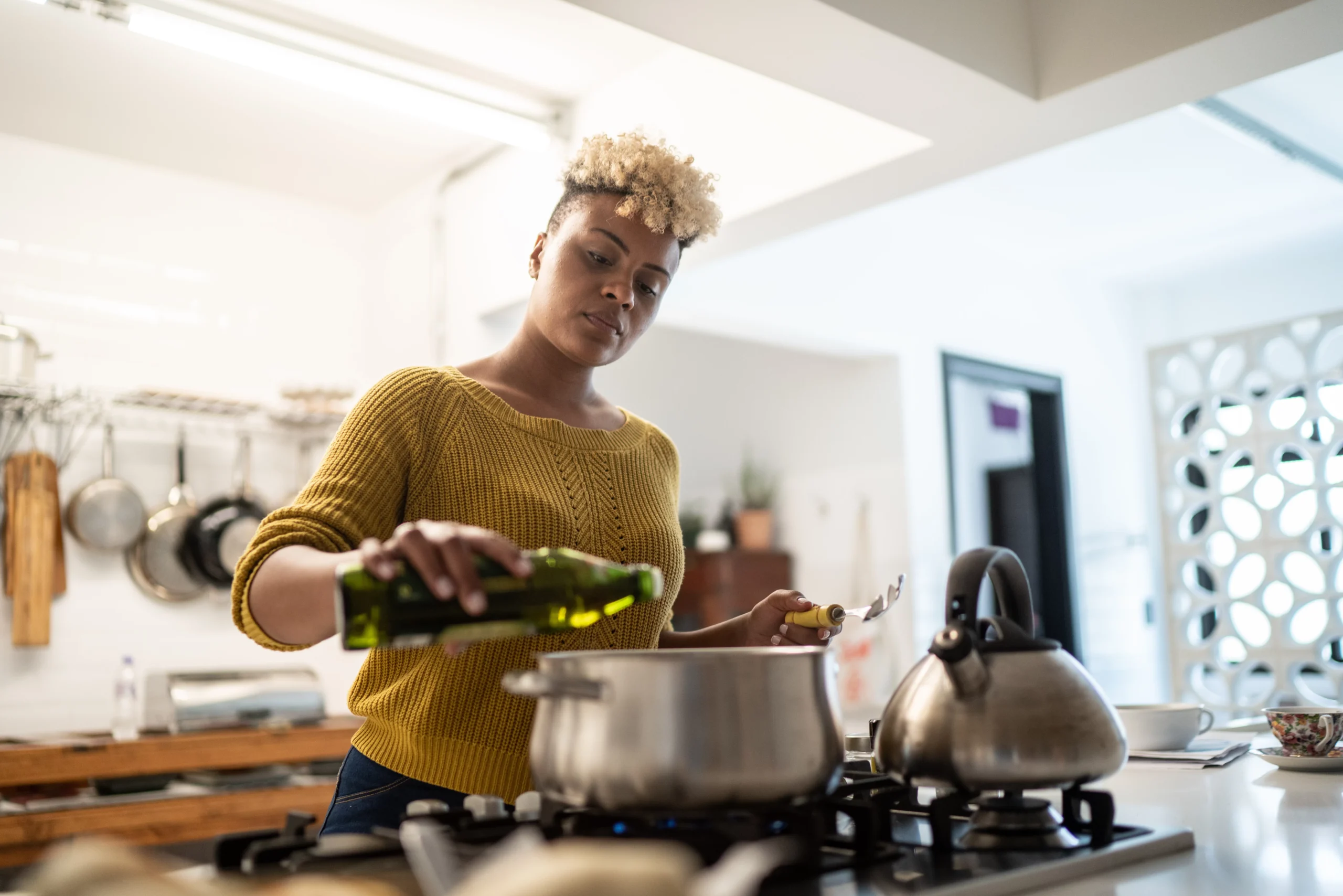- Judith Akatugba
- 0 Comments
- 776 Views
Cooking is one of those tasks that might make you anxious. Some find it soothing, but others don’t find it to be as soothing. Cooking can be intimidating if you’ve never done it before. However, it can get less stressful with practice. It takes time to get better at cooking, just like with any other talent. However, where does one even begin?
To begin creating healthier meals and making the most of your time in the kitchen, there are a lot of things to learn. You’ll need to understand how to season food, when to utilize recipes, and what kind of kitchen tools to buy. It’s also important to understand how to match main courses with appropriate sides and drinks. Naturally, though, knowing your own taste may enhance any culinary adventure. Among the most crucial pieces of advise we can give is this one. You should consider your personal tastes as you hone your culinary abilities.
Read Also: Most Bankable Lagos Real Estate Investment Communities
1. Acquire the skill of using seasoning
A key component of improving as a cook is understanding how to season food correctly. It might be overwhelming to browse the spice and herb section of your neighborhood supermarket, though, as there are so many options available that it can be difficult to decide which to choose. However, you will get better if you practice seasoning your meals and have patience.
Examine the labels closely to begin. If something piques your attention, look it up online. All people should be aware of a few fundamental seasoning elements, though. Your cuisine will taste more flavorful with salt added, and slightly spicy with black pepper. One typical spice to use to kick up the heat even further is cayenne pepper. You might find that you need to add cinnamon to some baking recipes in order to enhance their sweetness.
2. Follow recipes closely in the beginning
Every time they prepare a meal, novice cooks might need to adhere to a recipe. They must pay great attention to the instructions during this process. Some would-be chefs may find this disheartening because cooking is frequently talked about as a form of artistic expression. Following someone else’s instructions when cooking doesn’t always feel very creative.
However, by following these instructions, you will acquire crucial cooking abilities including measuring, seasoning, and mixing. Once you have more experience, you can begin adjusting the recipes you follow a little bit. These can range from little adjustments like switching out the salt to major ones like switching out the meat.
If you’re cooking something for the first time, even if you’re more experienced, you should definitely follow the recipe. However, when you’ve completed the first attempt, feel free to go beyond what is stated in those detailed instructions. You might discover new flavors and ingredients that you enjoy.
3. Invest in the appropriate kitchenware
You can probably find a trinket for anything that has to be done in the kitchen if you can think of it. For this reason, possessing the appropriate cooking tools might help you in your work. Consider the meals you want to prepare and design the kitchen to support you in doing that.
Do you intend to prepare smoothies for breakfast every day, for instance? Then you want to spend your money on a robust blender that can withstand repeated use. Do you slice meat, veggies, and fruit all the time? After that, spend your money on a superior cutting board and a pair of blades. You can even buy a sharpening for knives.
Kitchen tools may add up quickly, so do your homework and compare your options. Keeping your kitchen equipment in good working order is essential to your development as a chef. Give your cookware some TLC and make sure it’s stored correctly. This will extend the life of your tools and help you get the most out of your purchases.
4. Make use of quality ingredients
It’s critical that cooks utilize high-quality ingredients. Fortunately, there are several of methods for recognizing high-quality meals. See your neighborhood butcher if you’re seeking for high-quality meat cuts. Consult a seller at your neighborhood farmer’s market if you’re searching for tasty veggies to add to a salad. Cookbooks and the internet both have information on the topic. You can learn from these resources which ingredients are the best and how to recognize them in the grocery store.
Obtaining these things is, for many, the true problem. Some high-end products are just out of reach for home cooks. In other scenarios, you might reside in a place with a dearth of grocery stores, or at the very least, supermarkets carrying the products you’re after. Despite these challenges, it’s crucial to use high-quality ingredients. Your recipes will taste so much better as a result.
5. Take measurements of everything
Throughout a recipe, there are certain steps where following the directions exactly is crucial. Measuring your ingredients is one such occasion. This is particularly crucial when adding seasoning since, while you can always add more, you can never truly take it out of a dish. Making use of measuring devices, such as scales and cups, can help guarantee that this cooking process is successful.
You can measure your ingredients as you go or ahead of time. However, measuring things out in advance can occasionally be more helpful if you’re the type of person who becomes nervous or overwhelmed when cooking a recipe. In this manner, all you have to do is grab a bottle of your required ingredient, be certain that it already has the right amount, and throw it right into your dish. However, we understand that this cannot always be done.
6. Marinate and brine
Two practical methods for enhancing the flavor and tenderness of your meal are marinating and brining. Although they can be bought, marinades are frequently created from scratch. Salt, vinegar, and oil are common ingredients in marinades. These components are combined to form a marinade. After coating or immersing your meat—or anything else that requires marinating—in this marinade, let it sit for a while. Although the mixture is primarily composed of water and salt, the procedure for bringing meat is rather comparable.
While marinades are mostly used to add taste, brining is primarily used to make meat more moist. But both strategies add a great deal to your cooking. They aid to create a more pleasing result by allowing salt, acidic substances, or your preferred spices to seep deeper into your ingredients. Make sure the refrigerator is cold enough to prevent bacteria from forming while the meat is resting in the marinade or brine.
7. Try new things
As your culinary abilities advance, it’s critical to broaden your palate. You can achieve this by experimenting with new recipes, cooking methods, and culinary delights.
It’s not necessary to drastically alter your diet. You do not need to discover new ways to prepare this kind of seafood if you are allergic to shellfish. However, you can just choose a food type that you eat frequently and make it larger. For instance, if you often make chicken because you enjoy it, consider making different poultry like duck or quail instead. You can experiment with different things and learn how to make new dishes by sampling these.
In addition, aspiring chefs might broaden their culinary experiences by dining out. Naturally, eating out is typically more expensive. That being said, you can attempt to replicate your favorite meals at home by drawing inspiration from these dining experiences.
8. Pay attention to side dishes and drink pairings.
Most cooks concentrate on the entrée. It makes sense to do so because this dish is the main course. However, learning to make better side dishes and drinks is also part of being a great cook. These give the meal an extra dash of flair.
You can utilize side dishes to balance out the flavors in your entrée. For instance, rice is frequently given with chicken as a side dish. This combination works well since the rice absorbs some of the juice from the chicken. The same is true when it comes to the matching of steak with side dishes like potatoes. Your plate might get variety in flavor from the addition of side items. Sweet potatoes can be added to a savory dish, such as baked chicken, to complete the meal.
Another approach to produce something that goes well with supper is to make cocktails. The correct beverage can enhance or even introduce new flavors to the meal as it is being consumed. For instance, shellfish and gin-based cocktails are commonly combined, whereas BBQ and bourbon are regularly mixed together. Similar flavors are employed in both pairs to enhance one another. Try matching your favorite meals with certain cocktails.
9. Make notes and use cookbooks
Cookbooks are a valuable tool for skill development. They may introduce you to different flavors and cultures from around the globe in addition to teaching you how to prepare new cuisine. As your abilities grow, expand your book collection with readable and functional cookbooks. Select the ones that have dishes you’d want to taste or your favorite cuisines. Even specialized cookbooks on subjects like grilling, seafood, and side dish preparation are available for purchase.
You should not only purchase the appropriate cookbooks, but you should also consider how to annotate the recipes you make. When experimenting with new recipes, make a note of the things that you found challenging or the things you would modify if you were to make the dish again. As a reminder, write your notes in the margins or on small pieces of paper. Note pages are also included in some cookbooks.
10. Tidy up as you go
Cooking has the ability to quickly devastate any kitchen. Following a delicious meal that you have taken the effort to prepare, it can be disheartening to see a kitchen full of dirty dishes. Cleaning as you go is the key to overcoming that feeling and saving time.
After using an item, rinse it with warm water and stack it in the sink. Use the time you have when cooking food in the oven or on the stove to clean up the dishes and utensils you have finished using. By cleaning as you go, you can avoid wasting time at the end of the cooking process. This eliminates the need for a dishwasher and the possibility of long-term issues from leaving dirty dishes in the sink or the dishwasher.











